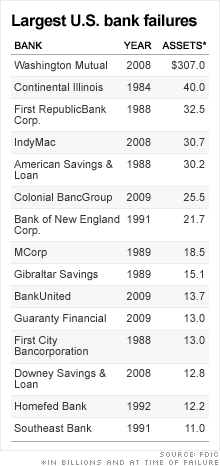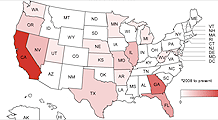Third largest bank failure of 2009 announced
Texas-based Guaranty Bank is bought by Spanish bank. Regulators also seize institutions in Alabama and Georgia, bringing this year's tally to 81.
NEW YORK (CNNMoney.com) -- Guaranty Bank was closed by federal regulators Friday in the third largest bank failure this year bringing the total number of failures to 81 in 2009.
The Federal Deposit Insurance Corporation was named receiver of the Austin, TX-based thrift, which had approximately $13 billion in assets and $12 billion in deposits as of June.
BBVA Compass, a U.S. subsidiary of Spanish bank Banco Bilbao Vizcaya Argentaria, agreed to assume all of Guaranty's deposits and will buy $12 billion of its assets. The FDIC said it would share losses on $11 billion of the failed bank's assets.
The 162 branches that Guaranty operated in Texas and California will reopen Monday as branches of BBVA Compass, which is based in Birmingham, Ala.
Guaranty was the third largest bank to fail in 2009. It tied for the title of 11th largest bank failure in U.S. history with First City Bancorporation, which failed in 1988.
The estimated cost of Guaranty's failure to the FDIC is $3 billion.
BBVA (BBV) emerged as the winning bidder for Guaranty's assets, beating out potential buyers including a private equity group led by investor Gerald Ford.
Jose Maria Garcia Meyer, chairman of BBVA Compass, in a statement said the transaction makes "excellent strategic sense" and represents an opportunity for BBVA to expand its presence in the "high growth Sunbelt Region."
The purchase marks the first time an overseas-based bank has bought a failed U.S. bank this year. However, the Bilbao-based bank made a series of acquisitions in Texas earlier this decade and already operates the fourth-biggest banking chain in the state by deposits.
Most of this year's failures have been small, regional banks that were brought down by rising delinquencies on home and other consumer loans as unemployment has risen to a 25-year high in one of the longest recessions on record.
Guaranty, which was the fourth Texas bank to fail this year, had a substantial number of risky mortgages made to California borrowers on its books. These loans became a severe liability as the housing market in California collapsed and borrowers defaulted in droves.
Option adjustable rate mortgages made up almost a third of Guaranty's single family mortgage portfolio, according to investor presentations on its Web site. Guaranty also had $1.2 billion of loans to homebuilders in California's overbuilt market.
BBVA said it will maintain regulatory capital ratios at a level that exceeds "well-capitalized" guidelines, and that the impact of transaction will be "immaterial" to BBVA.
California's housing woes also played a major role in last year's failures of Washington Mutual and IndyMac. WaMu, which had $307 billion in assets, was the largest U.S. bank failure on record.
Three other banks fail
Earlier in the day, regulators closed Birmingham, Ala.-based CapitalSouth Bank, which operated ten branches and had $617 million in assets and deposits of about $546 million.
Iberiabank, which is based in Lafayette, La, will assume all of the CapitalSouth's deposits and will purchase $589 million of its assets.
In Georgia, regulators closed Newnan-based First Coweta and arranged for United Bank, of Zebulon, to take over its four branches.
United Bank will pay the FDIC a premium of 1% to assume all of the First Coweta's $155 million in deposits and will buy $155 million of its assets.
Georgia regulators also closed the sole branch of Atlanta-based ebank, which will reopen on Monday as a branch of Stearns Bank.
St. Cloud, Minn.-based Stearns, which has bought a number of failed banks this year, will purchase the bulk of the failed bank's $143 million in assets and will assume all of its $130 million in deposits.
So far this year, 18 banks have failed in Georgia.
Friday's closure brings the total number of bank failures this year to 81, compared with a total of 25 in all of 2008.
The failures of CapitalSouth, First Coweta and ebank will cost the FDIC an estimated $262 million on top of the $3 billion from the failure of Guaranty Bank. Over the next five years, the agency expects roughly $70 billion in losses due to the failure of insured institutions.
Fortune's Colin Barr contributed to this report. ![]()



